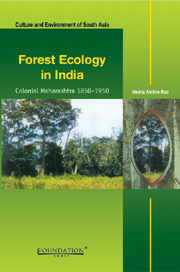Book contents
- Frontmatter
- Contents
- Preface
- Glossary
- Maps
- 1 Introduction
- 2 Pre-Colonial Maharashtra
- 3 Early British Management of Forests
- 4 Evolution of Forest Policy and Forest Acts of 1865 and 1878
- 5 Implementation of 1878 Act
- 6 Forest Policy During 1900–1950
- 7 People's Resistance
- 8 Conclusion
- Appendix - I
- Appendix - II
- Bibliography
- Index
Appendix - II
Published online by Cambridge University Press: 26 October 2011
- Frontmatter
- Contents
- Preface
- Glossary
- Maps
- 1 Introduction
- 2 Pre-Colonial Maharashtra
- 3 Early British Management of Forests
- 4 Evolution of Forest Policy and Forest Acts of 1865 and 1878
- 5 Implementation of 1878 Act
- 6 Forest Policy During 1900–1950
- 7 People's Resistance
- 8 Conclusion
- Appendix - I
- Appendix - II
- Bibliography
- Index
Summary
Minutes of Mr. Nulkar, Member of the Bombay Forest Commission 1887, recorded during the enquiry
In his minutes Nulkar said “When a strong and stable foreign government succeeds an indigenous one, in comparatively unsettled parts of the country, extreme measures of settlement at the earliest stages of the new administration are not frequently resorted to; but it is difficult to imagine a greater degree of oscillation of policy as regards the various agricultural interests, than is to be met within the different administrative measures taken at different epochs of the history of these districts, during the past 80 years. Beginning with the policy of putting every acre under cultivation and ending with the absorption of every inch that could be laid hands upon with impunity in the name of forest conservancy, a succession of extreme measures ran in opposite directions, inevitably resulting in the present chronic antagonism between the true interests of agriculture and a sound forest conservancy.”
On the acquisition of these territories, their first want was found to be population, the country being for the most part a ‘thinly inhabited forest’ The gradual settlement in it of the respectable and opulent natives of Mumbai and even the importation of Chinese emigrants were looked as possible means of bringing the land under cultivation.
- Type
- Chapter
- Information
- Forest Ecology in IndiaColonial Maharashtra, 1850-1950, pp. 236 - 242Publisher: Foundation BooksPrint publication year: 2007



